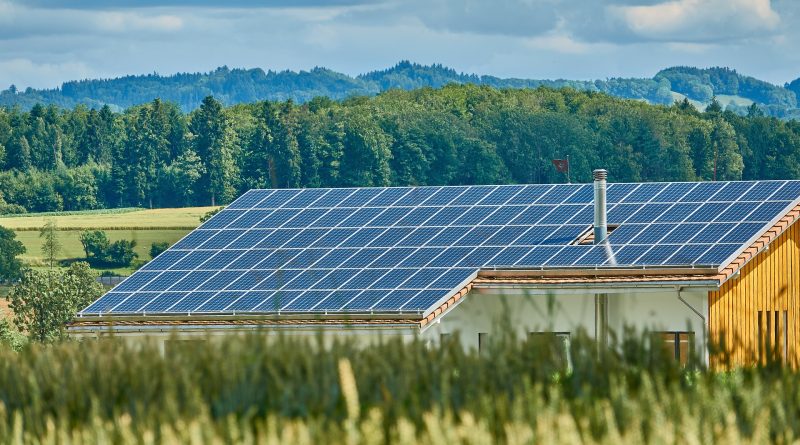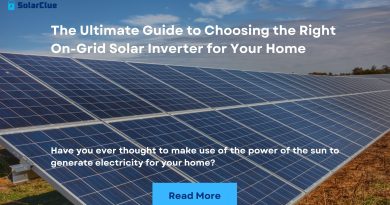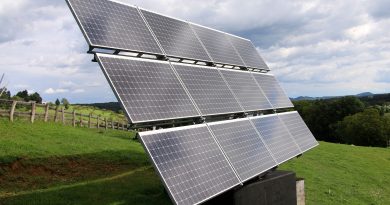On Grid Solar Power Systems
On-grid solar power systems, also known as grid-tied or grid-connected systems, are a popular choice for homeowners and businesses looking to harness the clean and renewable energy of the sun. These systems work by connecting to the local power grid, allowing users to generate electricity from solar panels and feed any excess energy back into the grid. In this blog let’s discuss how does On-Grid Solar Power System works and benefits.
Table of Contents
How Does an On-Grid Solar Power System Work?
An on-grid solar power system consists of several key components. The most important element is the photovoltaic (PV) panels that are installed on the roof or ground of a property. These contain solar cells that convert sunlight into electricity through the photovoltaic effect.
The electricity generated by the solar panels is then sent to an inverter, which converts the direct current (DC) electricity from the panels to alternating current (AC) electricity, which is the type of electricity used in homes and commercial buildings. The inverter also ensures that the energy produced is compatible with the grid’s voltage and frequency.
Once converted to AC, the electricity can be used to power appliances and devices within the property. Any excess electricity that is not utilized is fed back into the grid through a utility meter. This process is known as net metering, where the homeowner or business owner receives credits for the surplus energy they contribute to the grid.
Advantages of On-Grid Solar Power Systems
There are several advantages to choosing an on-grid solar power system:
1. Cost Savings: By generating your own electricity, you can significantly reduce your monthly utility bills. With net metering, any excess energy sent back to the grid can result in further savings or even a credit on your electricity bill.
2. Environmental Benefits: On-grid solar power systems rely on clean and renewable energy, reducing the dependence on fossil fuels. By choosing solar power, you can contribute to a more sustainable future and reduce your carbon footprint.
3. Grid Reliability: On-grid solar power systems provide a reliable and uninterrupted power supply. In case of low solar output or high electricity demand, you can instantly draw power from the grid, ensuring continuous access to electricity.
4. Incentives and Rebates: Many countries and regions offer incentives and rebates to encourage the adoption of solar power systems. These can include tax credits, grants, and favorable financing options, making the transition to solar more affordable.
Considerations for On-Grid Solar Power Systems
Before installing an on-grid solar power system, there are a few considerations to keep in mind:
1. Grid Dependency: On-grid systems require a stable connection to the local power grid. If your area experiences frequent power outages or if you live in a remote location without access to the grid, an off-grid or hybrid solar system may be more suitable.
2. System Sizing: To ensure optimal performance, it’s essential to determine the right size of the solar power system based on your energy needs and the available space for installation. Consulting with a professional solar installer can help you determine the appropriate system size.
3. Building Permits and Regulations: Before installing a solar power system, it’s important to check local regulations and obtain any necessary permits. These requirements can vary based on location, so it’s crucial to comply with all guidelines to ensure a smooth installation process.
Conclusion: Going Solar with On-Grid Solar Power Systems
Unlock the power of the sun affordably and sustainably with SolarClue®’s on-grid solar power systems. These environmentally-friendly solutions seamlessly connect to the local power grid, offering homeowners and businesses a reliable and cost-effective means of generating electricity while contributing to a greener future.
Before investing in an on-grid solar power system, trust SolarClue® to guide you through crucial considerations like grid reliability, system sizing, and adherence to local regulations. This ensures not only the maximization of solar energy benefits but also long-term cost savings and a significant reduction in your carbon footprint.
Choosing SolarClue® for your on-grid solar power system is a decisive step towards energy independence and sustainability. Together, let’s pave the way for a cleaner and brighter future for generations to come.
Frequently Asked Questions
An on-grid system is connected to the utility grid, allowing excess energy to be fed back and reducing dependence on the grid.
Solar panels generate electricity, and the system is connected to the grid, enabling energy exchange and reducing reliance on traditional power sources.
Benefits include cost savings, potential incentives, and reduced environmental impact compared to conventional power sources.
Yes, on-grid systems are suitable for residential use and offer a practical and efficient solution for homeowners.
Yes, many regions offer net metering programs, allowing users to receive credits or compensation for surplus energy fed back into the grid.
Yes, on-grid systems contribute to a greener environment by generating clean energy and reducing reliance on fossil fuels.
Regular inspection, cleaning, and monitoring are recommended to ensure optimal performance and longevity.
No, for safety reasons, on-grid systems are designed to shut down during power outages. Consider a battery backup for uninterrupted power supply.
Installation times vary but typically range from a few days to a couple of weeks, depending on system size and complexity.
Yes, check with local authorities for necessary permits and compliance with regulations before starting the installation process.



